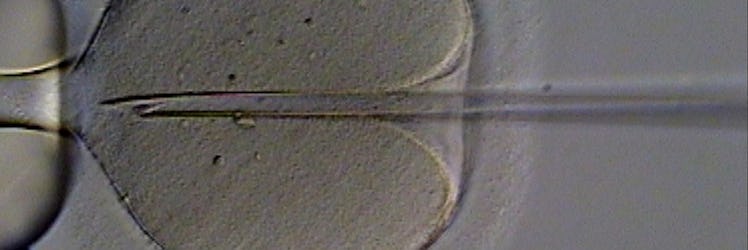This New Reproductive Technology Could Change The Game For Same-Sex And Infertile Couples
You get a baby, and you get a baby ...

When it comes to the future of assisted reproductive technology, thing are about to get very weird: There is a new way to make a baby. It’s called in vitro gametogenesis (IVG), and it has radical implications for the infertile, same-sex couples, poly thruples, and even your weird asexual friend.
IVG is a process that makes sperm cells from egg cells, or egg cells from sperm cells, without the use of embryos. So, a gay couple could create an egg from one of the guys’ sperm, fertilize it in vitro with the other guy’s sperm, and have a surrogate carry the baby to term. A lesbian couple could artificially inseminate one of the women’s eggs with sperm created from the other woman’s eggs. An MMF poly couple could combine both guys’ sperm and inseminate their partner. And — yes — your weird asexual friend could create sperm and eggs from their own genetic material and make a baby out of themselves. In every single case, the child born would be 100-percent the genetic offspring of its parents. Scientists are still working out some kinks in the process, but IVG has been done successfully with mice.
You might wonder if pulling this off with humans will create some thorny legal and ethical questions, and the answer to that is: Oh hell yes. Washington University Law professor Sonia Suter lays them out in excruciating detail in a recent piece for The Journal Of Law And Biosciences. She also gets into how IVG is a safer and more effective form of assisted reproductive technology than many methods currently in use. All of which is to say, Suter provides a (somewhat) compact summary of the very complicated brave new world of human reproduction that may very well be the norm by the time your own kids start procreating.
Whether that fascinates or frightens you, start getting your head around it now, because your grandkids could be coming from some unexpected places.
[H/T]: Mic.com
This article was originally published on